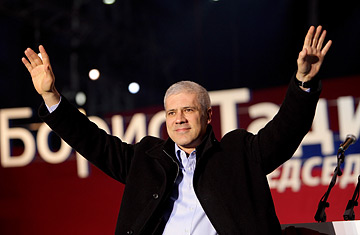
Serbian President Boris Tadic.
Fireworks blazed over the Belgrade night sky on Sunday as the crowd celebrated the victory of the incumbent Serbian President Boris Tadic over his ultranationalist rival Tomislav Nikolic. Tadic, a pro-Western former psychology teacher, won by less than a 3% margin in the tightest presidential race in Serbian history since the defeat of Slobodan Milosevic almost eight years ago.
But the real mood in the country was closer to relief then joy. If Nikolic had won, his victory would have signaled an end to Serbia's efforts to join the European Union, and a step closer toward its becoming Russia's satellite. Even Tadic, addressing the crowd from the balcony of his party headquarters in downtown Belgrade, conceded that it was a close call. "There's no time for a big celebration party," he said. "Much needs to be done." More than 2.1 million people, or 47.7 percent of the electorate, voted for Nikolic, while Tadic got just over 2.2 million votes, or close to 50.7 percent. President of the European Commission, José Manuel Barroso declared the result "a victory for democracy in Serbia and for the European values we share."
The election was held in the shadow of the imminent secession of Kosovo, the troubled Serbian province mostly populated by ethnic Albanians, which has been under U.N. control since 1999. Backed by most Western countries, Kosovo is now expected to declare independence in a matter of weeks. In Serbia, however, frustration over losing 15% of its territory stirred anti-Western sentiments, boosting Nikolic's chances in the race. A representative of the Serbian Radical Party, whose leader Vojislav Seselj is currently on trial in The Hague for war crimes committed during the breakup of Yugoslavia in the 1990's, Nikolic said that he would freeze Serbia's relations with the E.U. and allow Russia to build military bases in the country in the event of his election.
Nikolic's campaign also stressed corruption and the lack of real improvement in Serbia's economy. "Many of the people who voted for Nikolic are neither pro-Russian nor nationalist," political scientist Dusan Pavlovic told TIME. "They're just unhappy with all the failed promises of the present government."
Tadic's Democratic Party has an uneasy power-sharing deal with the Prime Minister Vojislav Kostunica, a moderate nationalist. Kostunica refused to support Tadic during the campaign, and shares many of Nikolic's pro-Russian sentiments. In January, Kostunica signed a much criticized privatization deal in Moscow, allowing Russia's oil giant Gazprom to assume full control over Serbia's oil and gas industry for just under $700 million. Tadic was skeptical about the deal — experts and even some government ministers felt it was too lenient towards Gazprom — but he stopped short of openly opposing it.
Kostunica, whose constitutional power as Prime Minister is stronger than the President's, also announced that he would freeze the membership talks with the E.U. if it sends a supervising mission to Kosovo to replace the current U.N. administration without the U.N. Security Council's approval. Russia, which supports Serbia's opposition to Kosovo's independence, is also opposed to the switch. The E.U. is in the final stages of planning its mission in Kosovo, although the date has not yet been set.
Kostunica's refusal to endorse Tadic and differences concerning relations with Russia and the E.U. has already put a serious strain on the ruling coalition, and most analysts agree that Serbia is heading towards early parliamentary elections this spring. "The coalition whose members can't agree about the country's basic policy has lost its meaning," says Miodrag Zec, an economic expert from Belgrade University. "We should have parliamentary elections in May, if not earlier."
Considering that the true power in Serbia lies in the government and not in presidential office, Tadic didn't win a war, but an opening struggle for Serbia's hearts and minds. The final battle is yet to begin, and given how deeply the country is divided, it will be an even closer call.
